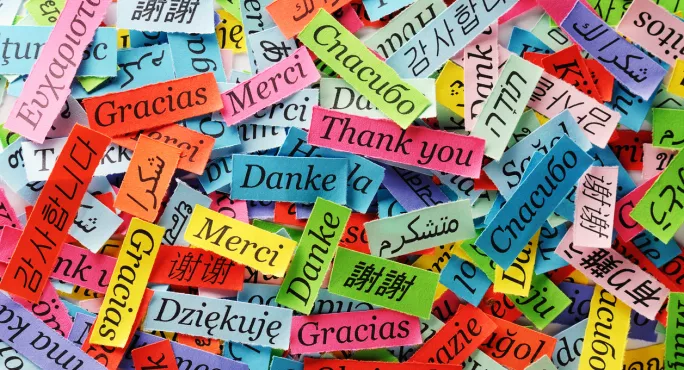Why we now offer lessons in eight languages

Like many international schools, we have a hugely diverse cohort of students, with 63 nationalities represented.
This means there is considerable linguistic diversity among students - from Belgians who speak more Mandarin than Flemish, to Nepalese with a penchant for German.
However, the language of instruction is English and this is something that, for many parents especially, is seen as an integral part of the internatioanal school offering owing to the perception that the language opens doors wherever they go in the world.
But this can cause issues.
Gaps in your own language
After all, if a student from China, say, does not learn key terms in science or art in their native language, they will end up disadvantaged should they wish to study medicine or literature at a top Chinese university.
Furthermore, it means their ability to use their native language for academic conversation or practice self-expression through creative writing is also lost.
Yet, for many years, students have perceived their mother tongue as “less valued” than other Western European languages and therefore their first language often lay dormant.
This sometimes meant that, when students reached IB level and were then given the opportunity to incorporate their mother tongue back into their schooling, huge gaps in grammar and vocabulary were often found.
Addressing the problem
Keen to address this issue, we set about creating a curriculum with more embedded opportunities for students to use their mother tongue earlier in the school - and not just in a single standalone lesson but embedded within the curriculum and across all subjects.
To do this, we redesigned our Year 7-9 curriculum into our bespoke Aiglon Discovery Programme (ADP) and put multilingualism and the provision for native languages as a central goal of what we wanted to deliver.
This means there is now a Native Language Discovery Reflection Session within the ADP, where students can study in either Italian, German, Spanish, Arabic, Mandarin, Japanese, Russian and, of course, French - the first language of our canton here in Switzerland.
These lessons allow students to discuss, reflect upon and investigate the questions associated with the Discovery Programme in their native language and create artefacts to demonstrate their understanding.
For instance, when a Year 7 learns about vaccines in science, patterns in maths and art, and writing persuasively in English, they can also reflect upon all of these things in Japanese, German or Chinese.
They can then produce a persuasive formal letter to their head of state drawing on vaccination information and data to explain why they need to accelerate the vaccination rollout.
A love of literature
Furthermore, there is a literature lesson every three weeks in order to encourage reading for pleasure in one’s own language.
This has involved working closely with our Centre for Enquiry (formally the library) to buy books from a plethora of multilingual authors, who are chosen for their ability to give children an insight into the contemporary society of their home culture.
Content is also chosen for its relevance to Discovery Programme content and therefore its potential to be analysed from a multitude of angles.
Learning your culture
This focus on literacy is key.
In international schools, a form of cultural shedding can often take place, where children gravitate away from their home culture and often adopt a watered-down “generic Western” identity.
What is more, the lack of formal education in their home language often means that vital vocabulary for daily life and the workplace are often missing.
The Native Language Discovery Reflection sessions encourage improved linguistic literacy in a student’s native language, as well as the improved cultural literacy of approaching universal questions through the lens of one’s own culture and therefore collective mindset.
This process, in turn, will improve their English as they develop a strengthened linguistic foundation.
Catering to other languages
What if your child is monolingual or speaks a language different to that of the eight offered at the school?
The answer is the “alternative” stream, in which students reflect upon the same questions as their peers but discuss and produce artefacts either in English (if their first language) or their mother tongue, with marking and grading outsourced to external tutors who speak that language.
For instance, one Year 7 has recently completed a project on the origins of Korean and how its unique writing system was born. This will be sent to an external examiner to be assessed against our Discovery Programme marking criteria.
In this “alternative” stream, the literature lesson is replaced with beginner’s Mandarin so as to allow students to delve into a new language rather than simply reading in English again.
By doing this, we are providing opportunities for students - and their parents - to understand that developing their mother tongue alongside English language skills is key to their educational development and later life opportunities.
Since doing so, we have seen very positive feedback from students - perhaps most notably the fact that we are noticing conversations around the school that involve friends discussing the similarities and differences between their languages and cultures, as their knowledge grows.
This has led to requests for more subjects to be taught in students’ native tongues. So much so, in fact, that our language teachers are, as I write these very words, busy translating lesson plans for Pythagoras and much more for the term ahead.
Tom Duckling is deputy head and Jack George is head of world languages at Aiglon College in Switzerland
You need a Tes subscription to read this article
Subscribe now to read this article and get other subscriber-only content:
- Unlimited access to all Tes magazine content
- Exclusive subscriber-only stories
- Award-winning email newsletters
Already a subscriber? Log in
You need a subscription to read this article
Subscribe now to read this article and get other subscriber-only content, including:
- Unlimited access to all Tes magazine content
- Exclusive subscriber-only stories
- Award-winning email newsletters